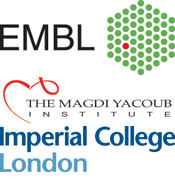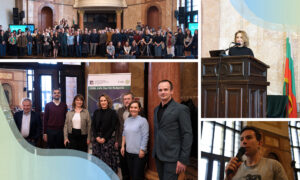Getting to the heart of cardiovascular diseases
A new collaboration covers the spectrum from molecules to therapies

Today three research organisations announce the merging of their expertise to fight cardiovascular diseases, which are among the most common health problems and causes of death in the world. The Magdi Yacoub Institute (MYI) at the UK’s Harefield Heart Science Centre, Imperial College London, and a unit of the European Molecular Biology Laboratory (EMBL) near Rome will work together to connect discoveries in basic research to new therapies and treatments.
“The medicine of the future will link discoveries about genes and the body’s healing mechanisms to prevention and therapies for diseases,” says Nadia Rosenthal, who heads EMBL’s Mouse Biology Unit in Monterotondo. “With the help of our transgenic mouse models for heart disease we can investigate the genes that play a role in the development of heart defects and this knowledge can then form the basis for clinical studies with patients.”
Sir Magdi Yacoub, founder and Director of Research at the Harefield Heart Science Centre funded by the MYI is one of the world’s foremost experts in the fields of organ transplantations and heart research. He established the largest heart and lung transplantation programme in the world at Harefield Hospital. The Heart Science Centre, which is operated collaboratively by the MYI, the Royal Brompton & Harefield Hospital Trust and the National Heart and Lung Institute at Imperial College, already has several research groups devoted to various aspects of heart disease, ranging from molecular and cell biology up to tissue engineering of heart valves. The new collaboration arose from contacts between Yacoub and Rosenthal, who has developed models of heart disease and tissue regeneration in mice.
“Basic and clinical research have traditionally been quite separate, and today there’s still a considerable gap,” Yacoub says. “Pooling the resources and expertise of our complementary institutes in this new collaboration we will bridge this gap. In this way we can obtain the integrated understanding of the cardiovascular system that we need to transfer what we have learned about heart diseases in the laboratory to patients as soon as possible.”
The collaboration will initially run for four years and will formalize joint research projects between the Yacoub and Rosenthal laboratories. One focus will be to study the molecular mechanisms that lead to heart failure, in hopes of finding ways to intervene. Another topic will be to investigate the molecular and cellular basis of new types of therapies, developed at the Heart Science Centre, which have been effective in reversing damage after heart failure. Finally, there will be a focus on heart transplantation and tissue engineering, aiming towards regenerative therapies.
Alongside research, the project will promote mutual education and exchanges of personnel, including a series of interdisciplinary courses and symposia.
The new collaboration builds on the existing strong connections between Imperial College London and EMBL. “This new centre of excellence for biomedical research will strengthen the close relations between the institutes and leads the way for many more collaborations in different research areas”, says Professor Stephen Smith, Principal of the Faculty of Medicine at Imperial College London.



